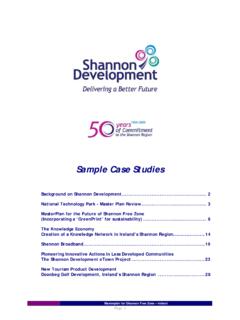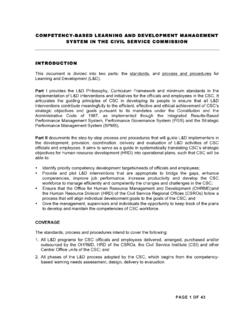Transcription of Assessing Social Practice Using the Professional ...
1 1 | Page NORTH LINCOLNSHIRE COUNCIL PEOPLE DIRECTORATE Assessing Social Work Practice Using the Professional Capabilities Framework Guidance Document February 2014 2 | Page CONTENTS Page No. 1. Introduction 3 2. Professional Capabilities Framework 4 3. How the Framework is made up 4. Nine Capabilities 5 6 5. Assessing Performance against the Professional Capabilities Framework 12 6. Appendices Demonstrating and Evidencing Capabilities 13 7. Useful References and Links 45 3 | Page Introduction The Professional Capabilities Framework (PCF) sets out the profession s expectations of what a Social worker should be able to do at each stage of their career and Professional development . Whilst it refers to the career stages set out by the Social Work Task Force (2009), it is a Professional , rather than an occupational framework.
2 It is expected that the framework will be used by all Social workers, in conjunction with the Social Work Reform Board (SWRB) Standards for Employers. The PCF provides the context in which the profession exercises judgement about the quality of Practice , for individuals, teams and organisations. The PCF applies to all Social workers in all roles and settings, including independent Social workers. It helps to shape Social work from the point at which an individual applies to a Social work qualifying programme, through advanced levels to principal Social worker. In the event of a Social Worker s Supervisor not holding a Social Work qualification, the supervisor will need to ensure there is appropriate input of Professional supervision, for ongoing support and CPD.
3 4 | Page 5 | Page How the Framework is made up The PCF is a Professional , rather than occupational, framework reflecting the complexity of Social Work activity requiring the application of knowledge, skills and values. The Framework contains nine capabilities which should be independent, not separate. Many issues will be relevant to more than one capability. For each of the nine capabilities there is a main statement and elaboration and a short working title. For each career stage, a number of capability statements are specified. These draw on the experience of practitioners working at that level, in relation to the nine capabilities. The nature of the expectations will vary at different levels and across the capabilities.
4 So, for example, there is a comprehensive set of expectations set for the qualifying level of Social work, since this comprises the basis for Professional development . There are however, fewer expectations at this level in relation to capability 9: Professional Leadership, whereas at other levels, such as Social work manager, the weighting given to this capability is greater. 6 | Page Nine Capabilities as follows; 7 | Page 8 | Page 9 | Page 10 | Page 11 | Page 12 | Page Assessing Performance against the Professional Capabilities Framework One way that the PCF will be used in North Lincolnshire Adult Services is for progression. Please see the Progression Framework for Qualified Social Workers online at The Framework illustrates how NQSW s will be assessed to move from grade 7 to grade 8 and for experienced Social workers the opportunity to progress from 8/9 where and when the posts are available at that level.
5 Whilst the PCF are not descriptions of specific posts, North Lincolnshire Adult Services as part of their Social Work Reform activity, have set a minimum level of expected capability linked to the grades of qualified Social workers. It is expected that all Social Workers evidence that they are meeting these Professional standards. Grade 7 Assessed and supported year in employment, moving to Social worker at end of first year in employment. Grade 8 Experienced Social Worker Grade 9/10 Professional Social Work Educator, Advanced Social Work Practitioner, Social Work Manager Grade 12+ Strategic Social Work Educator, Principal Social Worker, Strategic Social Work Manager. There are a range of ways Social Workers will evidence their CPD in order to meet registration criteria.
6 The completion of the mandatory training identified locally for Social workers will be a key component. Once the evidence is collated it will need to be recorded against the relevant capability levels and signed off through the supervision process. See Appendices. 13 | Page APPENDICES Evidencing Practice 14 | Page 15 | Page END OF ASYE Requirement How Demonstrated Supervisor Comments 1 Professionalism: Identify and behave as a Professional Social worker, committed to Professional development Be able to meet the requirements of the Professional regulator Be able to explain the role of the Social worker in a range of contexts, and uphold the reputation of the profession Make pro active use of supervision to reflect critically on Practice , explore different approaches to your work, support your development across the nine capabilities and understand the boundaries of Professional accountability Demonstrate professionalism in terms of presentation, demeanour, reliability.
7 Honesty and respectfulness 16 | Page Demonstrate workload management skills and develop the ability to prioritise Recognise and balance your own personal/ Professional boundaries in response to changing and more complex contexts Recognise your Professional limitations, and how to seek advice Identify your learning needs; assume responsibility for improving your Practice through appropriate Professional development Develop ways to promote wellbeing at work, identifying strategies to protect and promote your own well being and the well being of others 17 | Page Identify and implement strategies for responding appropriately to concerns about Practice or procedures, seeking guidance if required.
8 2 Values and Ethics: Apply Social work ethical principles and values to guide Professional Practice Understand and apply the profession s ethical principles and legislation, taking account of these in reaching decisions Recognise, and manage the impact of your own values on Professional Practice Recognise and manage conflicting values and ethical dilemmas to arrive at principled decisions Demonstrate respectful partnership work with service users and carers, eliciting and respecting their needs and views, and promoting their participation in decision-making wherever possible 18 | Page Recognise and promote individuals rights to autonomy and self-determination Promote and protect the privacy of individuals within and outside their families and networks, recognising the requirements of Professional accountability and information sharing 3 Diversity.
9 Recognise diversity and apply anti-discriminatory and anti-oppressive principles in Practice Identify and take account of the significance of diversity and discrimination on the lives of people, and show application of this understanding in your Practice Recognise oppression and discrimination by individuals or organisations and implement appropriate strategies to challenge Identify the impact of the power invested in your role on relationships and your intervention, and be able to adapt your Practice accordingly 19 | Page 4 Rights, Justice and Economic Wellbeing: Advance human rights and promote Social justice and economic well-being Begin to integrate principles of and entitlements to Social justice, Social inclusion and equality in your analysis and Practice , by identifying factors that contribute to inequality and exclusion, and supporting people to pursue options to enhance their well being Address oppression and discrimination applying the law to protect and advance people s rights, recognising how legislation can constrain or advance these rights Apply in Practice principles of human, civil rights and equalities legislation, and manage competing rights.
10 Differing needs and perspectives Recognise the impact of poverty and Social exclusion and promote enhanced economic status through access to education, work, housing, health services and welfare benefits Empower service users and carers through recognising their rights and enable access where appropriate to independent advocacy 20 | Page 5 Knowledge: Apply knowledge of Social sciences, law and Social work Practice theory Consolidate, develop and demonstrate comprehensive understanding and application of the knowledge gained in your initial training, and knowledge related to your specialist area of Practice , including critical awareness of current issues and new evidence-based Practice research Demonstrate knowledge and application of appropriate legal and policy frameworks and guidance that inform and mandate Social work Practice .








